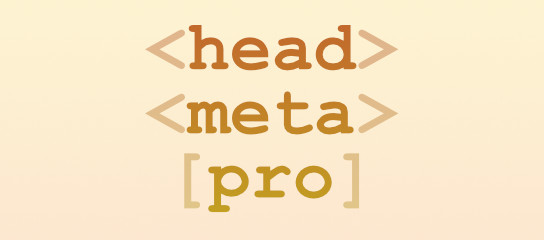Like most sites on the Web, Perishable Press is scanned constantly by malicious scripts looking for vulnerabilities and exploit opportunities. There is no end to the type and variety of malicious URL requests. It all depends on the script, the target, and the goal of the attack. Malicious scripts generally seek one of two things: Continue reading »
I am in the process of migrating my sites from A Small Orange to Media Temple. Part of that process involves canonicalizing domain URLs to help maximize SEO strategy. At ASO, URL canonicalization required just a few htaccess directives: # enforce no www prefix <ifmodule mod_rewrite.c> RewriteCond %{HTTP_HOST} !^domain\.tld$ [NC] RewriteRule ^(.*)$ http://domain.tld/$1 [R=301,L] </ifmodule> When placed in the web-accessible root directory’s htaccess file, that snippet will ensure that all requests for your site are not prefixed with www. There’s […] Continue reading »
Recently cleared several megabytes of log files, detecting patterns, recording anomalies, and blacklisting gross offenders. Gonna break it down into three sections: User Agents Character Strings IP Addresses User Agents User-agents come and go, and are easily spoofed, but it’s worth a few lines of htaccess to block the more persistent bots that repeatedly scan your site with malicious requests. # Nov 2010 User Agents SetEnvIfNoCase User-Agent "MaMa " keep_out SetEnvIfNoCase User-Agent "choppy" keep_out SetEnvIfNoCase User-Agent "heritrix" keep_out SetEnvIfNoCase User-Agent […] Continue reading »
Chris Coyier of CSS-Tricks recently declared that people should do “nothing” in response to other sites scraping their content. I totally get what Chris is saying here. He is basically saying that the original source of content is better than scrapers because: it’s on a domain with more trust. you published that article first. it’s coded better for SEO than theirs. it’s better designed than theirs. it isn’t at risk for serious penalization from search engines. If these things are […] Continue reading »
![[ 2010 User-Agent Blacklist ]](https://perishablepress.com/wp/wp-content/images/2010/misc-chunks/user-agent-blacklist.png)
The 2010 User-Agent Blacklist blocks hundreds of bad bots while ensuring open-access for the major search engines: Google, Bing, Ask, Yahoo, et al. Blocking bad user-agents is an effective addition to any security strategy. It works like this: your site is getting hammered by rogue bots that waste valuable server resources and bandwidth. So you grab a copy of the 2010 UA Blacklist from Perishable Press, include it in your site’s root .htaccess file, and enjoy better security and performance. […] Continue reading »

Awhile ago, Silvan Mühlemann conducted a 1.5 year experiment whereby different approaches to email obfuscation were tested for effectiveness. Nine different methods were implemented, with each test account receiving anywhere from 1800 to zero spam emails. Here is an excerpt from the article: When displaying an e-mail address on a website you obviously want to obfuscate it to avoid it getting harvested by spammers. But which obfuscation method is the best one? I drove a test to find out. After […] Continue reading »
![[ Black Hole (Vector) ]](https://perishablepress.com/wp/wp-content/images/2010/blackhole/blackhole-01.jpg)
One of my favorite security measures here at Perishable Press is the site’s virtual Blackhole trap for bad bots. The concept is simple: include a hidden link to a robots.txt-forbidden directory somewhere on your pages. Bots that ignore or disobey your robots rules will crawl the link and fall into the honeypot trap, which then performs a WHOIS Lookup and records the event in the blackhole data file. Once added to the blacklist data file, bad bots immediately are denied […] Continue reading »
Over the course of each year, I blacklist a considerable number of individual IP addresses. Every day, Perishable Press is hit with countless numbers of spammers, scrapers, crackers and all sorts of other hapless turds. Weekly examinations of my site’s error logs enable me to filter through the chaff and cherry-pick only the most heinous, nefarious attackers for blacklisting. Minor offenses are generally dismissed, but the evil bastards that insist on wasting resources running redundant automated scripts are immediately investigated […] Continue reading »
![[ Stop 404 Requests for Mobile Sites ]](https://perishablepress.com/wp/wp-content/images/2010/misc-chunks/stop-mobile-requests.jpg)
If you’ve been keeping an eye on your 404 errors recently, you will have noticed an increase in requests for nonexistent mobile files and directories, especially over the past year or so. The scripts and bots requesting these files from your server seem to be looking for a mobile version of your site. Unfortunately, they are wasting bandwidth and resources in the process. It has become common to see the following 404 errors constantly repeated in your log files: http://domain.tld/apple-touch-icon.png […] Continue reading »
![[ Enjoying the Evening ]](https://perishablepress.com/wp/wp-content/images/2010/misc-chunks/secure-phpinfo.jpg)
Whenever I find myself working with PHP or messing around with server settings, I nearly always create a phpinfo.php file and place it in the root directory of whatever domain I happen to be working on. These types of informational files employ PHP’s handy phpinfo() function to display a concise summary of all of your server’s variables, which may then be referenced for debugging purposes, bragging rights, and so on. While this sort of thing is normally okay, I frequently […] Continue reading »
Running a private site is all about preventing unwanted visitors. Here is a quick and easy way to allow access to multiple IP addresses while redirecting everyone else to a custom message page. To do this, all you need is an HTAccess file and a list of IPs for which you would like to allow access. Continue reading »
Given my propensity to discuss matters involving error log data (e.g., monitoring malicious behavior, setting up error logs, and creating extensive blacklists), I am often asked about the best way to go about monitoring 404 and other types of server errors. While I consider myself to be a novice in this arena (there are far brighter people with much greater experience), I do spend a lot of time digging through log entries and analyzing data. So, when asked recently about […] Continue reading »
You have seen user-agent blacklists, IP blacklists, 4G Blacklists, and everything in between. Now, in this article, for your sheer and utter amusement, I present a collection of over 8000 blacklisted referrers. Shortcut: skip the article and jump to Disclaimer and Download » Referrer Spam Sucks For the uninitiated, in teh language of teh Web, a referrer is the online resource from whence a visitor happened to arrive at your site. For example, if Johnny the Wonder Parrot was visiting the […] Continue reading »
![[ Image: Inverted Eclipse ]](https://perishablepress.com/wp/wp-content/images/2009/agent-blacklist/inverted-eclipse.jpg)
As discussed in my recent article, Eight Ways to Blacklist with Apache’s mod_rewrite, one method of stopping spammers, scrapers, email harvesters, and malicious bots is to blacklist their associated user agents. Apache enables us to target bad user agents by testing the user-agent string against a predefined blacklist of unwanted visitors. Any bot identifying itself as one of the blacklisted agents is immediately and quietly denied access. While this certainly isn’t the most effective method of securing your site against […] Continue reading »
![[ 4G Stormtrooper ]](https://perishablepress.com/wp/wp-content/images/2009/misc-chunks/stormtrooper-4g.jpg)
At last! After many months of collecting data, crafting directives, and testing results, I am thrilled to announce the release of the 4G Blacklist! The 4G Blacklist is a next-generation protective firewall that secures your site against a wide range of automated attacks and other malicious activity. Continue reading »
I really hate bad robots. When a web crawler, spider, bot — or whatever you want to call it — behaves in a way that is contrary to expected and/or accepted protocols, we say that the bot is acting suspiciously, behaving badly, or just acting stupid in general. Unfortunately, there are thousands — if not hundreds of thousands — of nefarious bots violating our sites every minute of the day. For the most part, there are effective methods available enabling […] Continue reading »

![[ 2010 User-Agent Blacklist ]](https://perishablepress.com/wp/wp-content/images/2010/misc-chunks/user-agent-blacklist.png)

![[ Black Hole (Vector) ]](https://perishablepress.com/wp/wp-content/images/2010/blackhole/blackhole-01.jpg)
![[ Stop 404 Requests for Mobile Sites ]](https://perishablepress.com/wp/wp-content/images/2010/misc-chunks/stop-mobile-requests.jpg)
![[ Enjoying the Evening ]](https://perishablepress.com/wp/wp-content/images/2010/misc-chunks/secure-phpinfo.jpg)
![[ Image: Inverted Eclipse ]](https://perishablepress.com/wp/wp-content/images/2009/agent-blacklist/inverted-eclipse.jpg)
![[ 4G Stormtrooper ]](https://perishablepress.com/wp/wp-content/images/2009/misc-chunks/stormtrooper-4g.jpg)